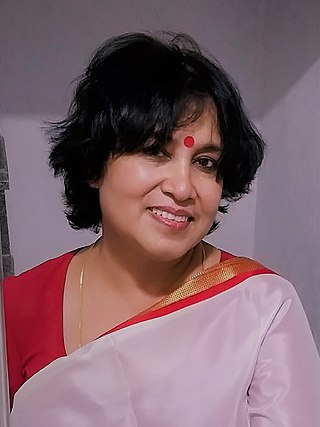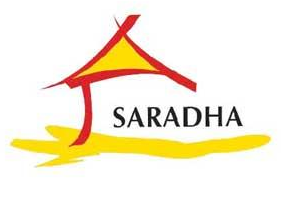
Sita Ram Goel was an Indian historian, religious and political activist, writer, and publisher known for his influential contributions to literature pertaining to Hinduism and Hindu nationalism in the late twentieth century. His work has been both celebrated and criticised for its bias towards Hindu nationalism and its controversial portrayal of other religions, particularly Islam and Christianity.

Taslima Nasrin is a Bangladeshi writer, physician, feminist, secular humanist, and activist. She is known for her writing on women's oppression and criticism of religion; some of her books are banned in Bangladesh. She has also been blacklisted and banished from the Bengal region, both from Bangladesh and the Indian state of West Bengal.

Huseyn Shaheed Suhrawardy was a Pakistani Bengali barrister and politician. In Bangladesh, Suhrawardy is remembered as a pioneer of Bengali civil rights movements, later turned into Bangladesh independence movement, and the mentor of Bangladesh's founding leader Sheikh Mujibur Rahman. He is also remembered for his performance as the Minister for Civil Supply during the Bengal famine of 1943. In India, he is seen as a controversial figure; directly responsible for the 1946 Calcutta Killings, for which he is often referred as the "Butcher of Bengal" in West Bengal.

The Statesman is an Indian English-language broadsheet daily newspaper founded in 1818 and published simultaneously in Kolkata, New Delhi, Siliguri and Bhubaneswar. It incorporates and is directly descended from The Friend of India. It is owned by The Statesman Ltd and headquartered at Statesman House, Chowringhee Square, Kolkata, with its national editorial office at Statesman House, Connaught Place, New Delhi. It is a member of the Asia News Network.
Nikah halala, also known as tahleel marriage, is a practice in which a woman, after being divorced by triple talaq, marries another man, consummates the marriage, and gets divorced again in order to be able to remarry her former husband. Nikah means marriage and halala means to make something halal, or permissible. This form of marriage is haram (forbidden) according to the hadith of Islamic prophet Muhammad. Nikah halala is practiced by a small minority of Muslims, mainly in countries that recognise the triple talaq.

Mamata Banerjee is an Indian politician who is serving as the eighth and current chief minister of the Indian state of West Bengal since 20 May 2011, the first woman to hold the office. Having served multiple times as a Union Cabinet Minister, Mamata Banerjee became the Chief Minister of West Bengal for the first time in 2011. She founded the All India Trinamool Congress in 1998 after separating from the Indian National Congress, and became its second chairperson later in 2001. She is often referred to as Didi.
Censorship in India has taken various forms throughout its history. Although de jure the Constitution of India guarantees freedom of expression, de facto there are various restrictions on content, with an official view towards "maintaining communal and religious harmony", given the history of communal tension in the nation. According to the Information Technology Rules 2011, objectionable content includes anything that "threatens the unity, integrity, defence, security or sovereignty of India, friendly relations with foreign states or public order".
United Bengal was a proposal to transform Bengal Province into an undivided, sovereign state at the time of the Partition of India in 1947. It sought to prevent the division of Bengal on religious grounds. The proposed state was to be called the Free State of Bengal. A confessionalist political system was mooted. The proposal was not put up for a vote. The British government proceeded to partition Bengal in accordance with the Mountbatten Plan and Radcliffe Line.

Nandan is a government-sponsored film and cultural centre in Kolkata, India. The primary aim of the cultural hub is to encourage and facilitate cinematic awareness in society. It includes a few comparatively large screens housed in an impressively architectured building. The complex, besides being a modern cinema and cultural complex, is a popular destination for the young and the aged alike.
The United Nations categorizes Bangladesh as a moderate democratic Muslim country. Sunni Islam is the largest and most dominant religion practiced in the country. In the Constitution of Bangladesh, Islam is referred to twice in the introduction and Part I of the constitution. The document begins with the Islamic phrase Bismillahir Rahmanir Raheem which in English is translated as "In the name of Allah, the Beneficent, the Merciful" and article (2A) declares that:"Islam is the state religion of the republic".

Hawkers in Kolkata numbering 275,000 generated business worth ₹ 87.72 billion in 2005. In Kolkata, formerly known as Calcutta, in the Indian state of West Bengal, almost 80 per cent of the pavements are encroached by hawkers and illegal settlers. In many countries, hawkers use pavements or other public places to retail their goods or services but in Kolkata the magnitude has drawn special attention of administrators and law courts.
The hate speech laws in India aim to prevent discord among its many ethnic and religious communities. The laws allow a citizen to seek the punishment of anyone who shows the citizen disrespect "on grounds of religion, race, place of birth, residence, language, caste or any other ground whatsoever". Section 153A of the Indian penal code prohibits citizens from creating disharmony or feelings of enmity, hatred or ill-will between different groups of people.
This is a bibliography of literature treating the topic of criticism of Islam, sorted by source publication and the author's last name.

Secularism in Bangladesh is known as "neutrality of religion" under Bangladeshi law. In the Constitution of Bangladesh, secularism is mentioned in the preamble as one of the fundamental principles of Bangladeshi law. Article 8 enshrines secularism as one of the fundamental principles of state policy. Article 12 elaborates further on secularism and freedom of religion.

The Saradha Group financial scandal was a major political scandal caused by the collapse of a Ponzi scheme run by Saradha Group, a consortium of over 200 private companies that was believed to be running collective investment schemes popularly but incorrectly referred to as chit funds in Eastern India.
An illegal immigrant in India is a foreigner who has entered India either without valid documents or who initially had a valid document, but has overstayed beyond the permitted time, as per the general provisions of the Citizenship Act as amended in 2003. Such persons are not eligible for citizenship by registration or naturalisation. They are also liable to be imprisoned for 2–8 years and fined.
The Citizenship (Amendment) Act, 2019 (CAA) was passed by the Parliament of India on 11 December 2019. It amended the Citizenship Act, 1955 by providing an accelerated pathway to Indian citizenship for persecuted religious minorities from Afghanistan, Bangladesh and Pakistan who arrived in India by 2014. The eligible minorities were stated as Hindus, Sikhs, Buddhists, Jains, Parsis or Christians. The law does not grant such eligibility to Muslims from these countries. The act was the first time that religion had been overtly used as a criterion for citizenship under Indian law, and it attracted global criticism.

Dwikhandito is an autobiographical book of Bengali novelist and poet Taslima Nasrin, published in 2003. This is the third volume of Amar Meyebela. The book was first published in Bangladesh under the title Ko ("Speak") and banned. It was also banned in the Indian state of West Bengal for two years alleging insult of religious beliefs and obscenity. In March 2018 the book was translated into English and published as Split: A Life by Penguin Random House.

Nesaruddin Ahmad was a Bengali Islamic scholar, spiritual reformer, educationist and writer. He was the main disciple of Furfura Sharif's Mohammad Abu Bakr Siddique in eastern Bengal. Ahmad was the inaugural Pir of Sarsina, having founded the Sarsina Darbar Sharif and Darussunnat Kamil Madrasa in 1915, one of the largest Islamic institutions in South Bengal and the first major alia madrasah after Calcutta. Ahmad was among the leading Islamic leaders in colonial Barisal, and his influence extended across Bengal. The Nesarabad Upazila of Bangladesh has been named after him.










